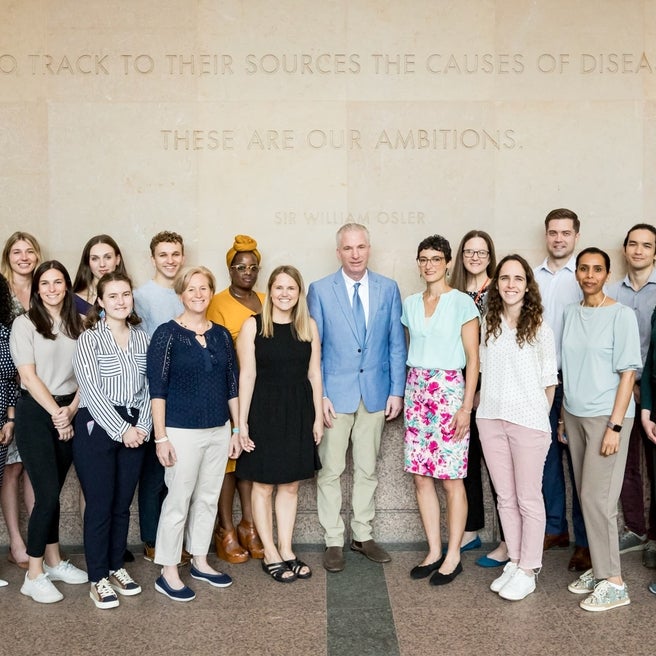What is mucopolysaccharidosis type II?
Mucopolysaccharidosis type II (MPS II), also known as Hunter syndrome, is a rare inherited lysosomal storage disease in which the body is missing or does not have enough of an enzyme needed to break down long chains of sugar molecules called glycosaminoglycans (GAGs). As a result, the molecules build up in different parts of the body and cause damage that leads to various health problems.
An early-onset form of the disease begins shortly after birth and is more severe. In a late-onset form, less severe symptoms appear later in life.
Causes of mucopolysaccharidosis type II
MPS II is caused by a disease-causing (pathogenic) gene mutation in the IDS gene. This gene provides instructions for the production of the iduronate 2-sulfatase enzyme which is needed to break-down complex sugars, known as glycosaminoglycans (GAGs), that are produced in the body. With little to no enzyme circulating in the body, the GAGs then accumulate within body’s cells. This is why many tissues and organs are enlarged in this disorder.
The affected IDS gene is on the X chromosome. As such, boys are almost exclusively affected because they inherit the X chromosome from their mothers. Their mothers do not have symptoms of the disease, but they carry a nonworking copy of the gene.
Symptoms of mucopolysaccharidosis type II
Children with MPS II often have no symptoms of the condition at birth. People with severe MPS II generally begin to show signs and symptoms of the disorder between 18 months and 4 years of age. Symptoms of slowly progressive forms of MPS II tend to present a couple of years later.
Individuals with MPS II typically develop:
- Coarsened facial features, such as full lips, rounded cheeks, and a broad nose,
- An enlarged tongue and vocal cords
Many other organs and tissues can become enlarged with MPS II, including the head, liver and spleen.
Patients may also have:
- Frequent upper respiratory infections
- Recurrent ear infections
- Hearing loss
- Hernias
- Joint stiffness and dysostosis multiplex
- Carpal tunnel syndrome
- Valvular heart disease
- Hydrocephalus
- Diarrhea
In addition, growth for children with MPS II usually slows after age 5.
Diagnosis of mucopolysaccharidosis type II
Early diagnosis is challenging because the symptoms of MPS II can also be attributed to many other more common disorders. Diagnosis is made by a physical exam and one of the following:
- Low iduronate 2-sulfatase enzyme activity
- Elevation of plasma and/or urine GAGs
Diagnosis can be confirmed by genetic testing, which will reveal a pathogenic variant in the IDS gene.
Treatment for mucopolysaccharidosis type II
Currently, there is no cure for MPS II, but there is treatment available.
Enzyme replacement therapy (ERT) uses an intravenous solution to replace the deficient or missing enzyme in the body. One specific ERT, Elaprase® (idursulfase), is given as an infusion every other week. Although it does not cross the blood-brain barrier or improve the central nervous system (CNS) effects, the treatment has been shown to improve many somatic signs and symptoms of MPS II.
Treatment is primarily geared towards management of the individual symptoms of MPS II. Patients are followed at least every 6 months by the Lysosomal Storage Disease (LSD) Center at Children’s Hospital of Philadelphia (CHOP) in its multidisciplinary MPS Clinic. The clinic includes appointments with Physical Therapy and Developmental Pediatrics. Patients are also followed by other subspecialists including Pulmonology, Cardiology and Orthopedics, among others.
In addition, the Cell and Gene Therapy Collaborative at CHOP is conducting gene therapy clinical trials for MPS II, with the aim of developing new gene therapies for this disease.
Resources to help
Lysosomal Storage Disease (LSD) Center Resources
Caring for a child with a lysosomal storage disease can be overwhelming. We have created resources to help you find answers to your questions and feel confident in the care you are providing your child.
Reviewed by Can Ficicioglu, MD, PhD, Nicole L. Luongo, Caitlin Menello, MS, LCGC
